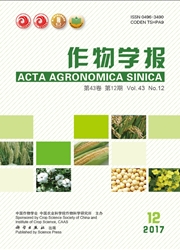

 中文摘要:
中文摘要:
为了探索花生属异源多倍体进化理论和种间杂交过程所涉及的遗传机制,以四倍体栽培种花生与二倍体野生种A.doigoi及其种间杂种F1和早期多倍体世代(S0~S3)为材料,采用cDNA-SCoT技术研究花生属人工异源多倍体进化早期基因表达变化规律。12条SCoT引物共扩增出108个cDNA片段,获得差异片段80个,占扩增总条带数的74.07%,对其中的35个差异片段进行克隆测序,有26个和GenBank数据库中已录入的基因具有较高的相似性,包括能量与代谢相关基因(8个)、未知功能蛋白基因(3个)、抗逆性相关基因(4个)、信号传导相关基因(2个)和反转录转座子相关基因(9个)。这说明花生属种间杂交人工异源多倍化早期世代发生着快速、剧烈的基因表达变化;从中获得的一些差异基因片段可用于花生属异源多倍化的分子机制研究。
 英文摘要:
英文摘要:
To explore the allopolyploidy evolutionism and the genetic mechanism of Arachis interspecific hybridization, study the gene expression variation by cDNA-SCoT technique in the early period of Arachis artificial allopolypoidy evolution, using the progenitors, F1 and early polyploidy generations (S0 to S3) of the hybridization between tetraploid cultivated peanut and diploid wild peanut A. doigoi. Among 108 cDNA fragments amplified by 12 SCoT primers 80 were differentially expressed with the polymorphism frequency of 74.07%. Among 80 TDFs (transcripts derived fragments) 35 were cloned and sequenced, and the sequences of 26 TDFs shared high similarity with the genes documented in the GenBank. These genes included energy and me-tabolism-related genes (8), resistance-related genes (4), unknown functional protein genes (3), signal transduction-related genes (2), and retrotransposon-related genes (9). These results indicated that gene expression changes happened rapidly and drastically in the early generations during artificial allopolyploidization of peanut interspecific hybridization, and some obtained TDFs probably could be used in the research of molecular mechanism of Arachis allopolyploidization.
 同期刊论文项目
同期刊论文项目
 同项目期刊论文
同项目期刊论文
 期刊信息
期刊信息
